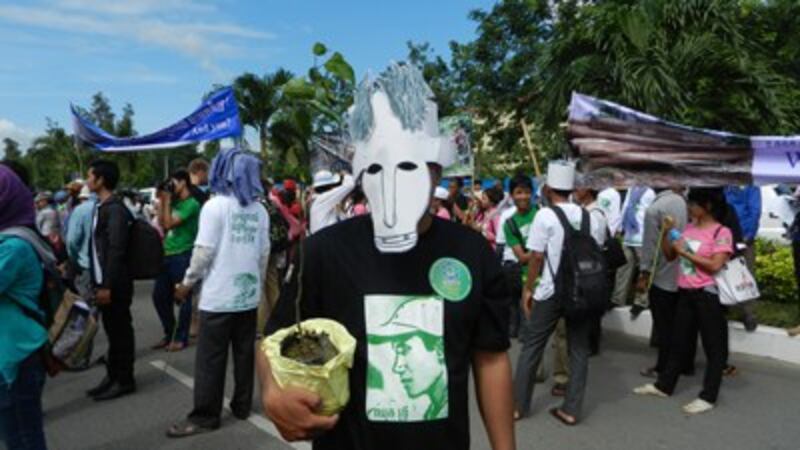Cambodian land activists have appealed to local authorities to resolve a land dispute involving a sugar company they say encroached on farmland belonging to more than 1,000 villagers as they highlighted the country’s problem-ridden system of land concessions to mark World Environment Day on Tuesday.
More than 50 activists, from Am Laing commune in central Cambodia’s Kompong Speu province, said the Phnom Penh Sugar Company, owned by casino tycoon and ruling Cambodian People’s Party (CPP) senator Ly Yong Phat, had taken land farmed for years and offered those who cultivated it little compensation.
The land dispute has been dragging on for two years without any signs of an imminent resolution.
Speaking during a public debate organized by the Cambodian Center for Human Rights (CCHR), villager Ly Lao said the company, after taking his land, now plans to sue him and several others for “destroyed” company property following protests they held against the alleged land grab.
He said he has already been summoned by the court to testify in the lawsuit against at least 43 villagers on charges of destroying company property during their protests.
“I received a warrant accusing me of destroying the company’s property,” Ly Lao said.
“I have appealed to the lawmakers to help me,” he said.
The debate was attended by parliamentarians from the Sam Rainsy Party (SRP) and Human Rights Party (HRP), but no CPP officials showed up, the activists said.
More than 1,000 villagers say they have been affected by the land grab, having lost around 2,000 hectares (4,940 acres) since the government awarded the sugar company an 8,000 hectare (19,770 acre) concession in 2010.
A villager, who asked to remain anonymous, also charged that the company had illegally seized their land and forced them to move to higher ground, where they are unable to grow crops.
“Please make the company stop taking our land,” the villager said at the debate. “The villagers are eating rice and the company is eating sugar cane. Please give us a way to survive.”
Debate refused
CCHR coordinator Ouch Leng said Phnom Penh Sugar is not interested in resolving the dispute with the villagers and has refused to participate in the debate.
“The company has refused to resolve the case and the local authorities don’t have the power to talk with company representatives,” he said.
He said that villagers had been forced to accept low compensation for their land and that if they refused, the company would file a complaint with the court and the villagers would end up in prison.
Deputy provincial governor Pen Sambo told the debate that the authorities were working to resolve the land conflict “based on the law and the people’s interests.”
HRP lawmaker Ou Chanrith said land conflict in Cambodia is common because it is tied to concessions.
“Land concessions make the villagers the victims and only a few corrupt officials benefit from the deal,” he said.
SRP Member of Parliament Nuth Rumdoul, who attended the debate, said he would write to the Senate and government to demand adequate compensation for the villagers in a bid to resolve the dispute.
Opposition party members have called on European countries not to purchase sugar from the Phnom Penh Sugar Company, calling the product “blood sugar.”

Environment day
The debate over the concession came as more than 300 activists gathered in front of Cambodia’s National Assembly on Tuesday to mark World Environment Day, commemorating the life of recently murdered prominent environmentalist Chut Wutty, who was shot while investigating a logging concession in a protected forest.
The activists, who represented forest, land, and union concerns, honored Chut Wutty—gunned down in April in central Cambodia’s Prey Lang forest—by wearing shirts with his image and the slogan, “To destroy the forest is to destroy yourself.”
They also carried banners and sang songs calling on the public to lend its support in protecting the forest and the indigenous inhabitants who rely on it for their livelihood.
Prey Lang activist Phouk Hong, from northern Cambodia’s Preah Vihear province, said that without protecting the forest from logging by encroaching concessions, the people and wildlife of the country’s forests would be wiped out.
Prey Lang forest in central Cambodia hosts Southeast Asia's largest lowland evergreen forest but remains unprotected.
“I like the forest and I will protect the forest, which means that I will protect the world,” Phouk Hong said, adding that the activist community would continue to fight against illegal logging despite Chut Wutty’s death.
Rights group Licadho’s senior investigator Am Sam Ath said the government should reexamine its land concession policy.
“I appeal to the government to take the necessary measures to effectively prevent illegal logging in Cambodia,” he said.
“The government must reconsider granting licenses for the sake of the environmental protection.”
After gathering in front of the National Assembly, the group of activists went on to pray at a shrine in front of the Royal Palace, hoping to convince government officials to protect the environment for the younger generation.
Reported by Sonorng Khe and So Chivi for RFA’s Khmer service. Translated by Samean Yun. Written in English by Joshua Lipes.
